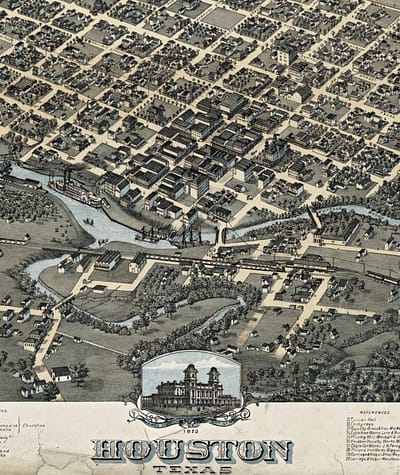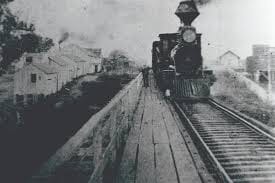
Houston, Texas, a vibrant and sprawling metropolis, is one of the fastest-growing cities in the United States. With a diverse cultural fabric, a robust economy, and a rich history, Houston stands as a testament to Texas’s spirit of innovation and resilience. This article takes you on a journey through the history of Houston, from its humble beginnings to the dynamic urban center it is today.
The Founding of Houston: Early Beginnings
Houston was founded on August 30, 1836, by two New York land speculators, Augustus Chapman Allen and John Kirby Allen. They purchased 6,642 acres of land along the Buffalo Bayou and named the city after Sam Houston, a prominent figure in Texas’s fight for independence from Mexico and the first president of the Republic of Texas.
Initially, Houston was conceived as a trade and transportation hub. Thanks to its strategic location near waterways, the city became a vital connection point for goods and people moving through the region. Early settlers relied heavily on the bayous for transporting timber, cotton, and other goods, establishing Houston’s role as a commercial hub.
The Growth of the City: The Railroad and Oil Boom

Houston’s real transformation began in the late 19th century with the arrival of the railroads. In 1861, the Houston and Texas Central Railway connected the city to major trade routes, leading to a population and economic boom. This infrastructural development enabled Houston to grow rapidly as a transportation and distribution center.

However, the event that truly skyrocketed Houston’s growth was the discovery of oil at nearby Spindletop in 1901. The discovery turned Houston into the oil capital of the United States, and by the 1920s, the Port of Houston was one of the busiest in the country. The oil boom laid the foundation for the city’s long-standing relationship with the energy sector, which continues to define its economy to this day.
Houston During the 20th Century: Space and Beyond
The 20th century saw Houston continue its rise on the national and global stage. In 1961, the National Aeronautics and Space Administration (NASA) established the Manned Spacecraft Center (now the Johnson Space Center) in Houston. This cemented the city’s place in history as the home of the U.S. space program. The famous phrase “Houston, we have a problem” from the Apollo 13 mission made the city a household name worldwide.

During this time, Houston also became a major hub for medical advancements. The Texas Medical Center, founded in 1945, is now the largest medical complex in the world, attracting millions of patients and medical professionals annually. This, along with the growth of the city’s industries, contributed to a steady rise in population and economic diversity.
Diversity and Cultural Growth
Today, Houston is recognized as one of the most diverse cities in the United States. The city’s history of immigration has shaped its culture, food, and neighborhoods. In the late 20th century, Houston saw an influx of immigrants from Latin America, Asia, and the Middle East, enriching the city’s cultural landscape. This diversity is evident in the city’s annual festivals, such as the Houston Livestock Show and Rodeo, Houston Pride Parade, and the Houston International Festival.

Houston’s Museum District and Theater District are nationally recognized, drawing millions of visitors each year. With over 150 museums, art galleries, and performance venues, Houston has grown into a cultural powerhouse, rivaling cities like New York and Los Angeles in terms of artistic influence.
The Modern Era: A Resilient and Forward-Thinking City
In recent decades, Houston has faced its share of challenges. Hurricanes and flooding, particularly Hurricane Harvey in 2017, tested the city’s resilience. However, Houstonians demonstrated incredible strength in rebuilding and supporting one another during times of crisis. The city’s infrastructure and urban planning have since adapted to better handle such natural disasters.
Houston’s economy has also diversified beyond oil. The city is now a leader in aerospace, biotechnology, and technology sectors. With its large and skilled workforce, Houston has positioned itself as a future-forward city, embracing clean energy initiatives and sustainability efforts.
Looking Ahead: The Future of Houston
As Houston continues to grow, its future looks bright. With a population exceeding 2.3 million, the city is poised to remain an influential center of commerce, culture, and innovation. Ongoing efforts to improve public transportation, green energy, and flood resilience are shaping the future of this great city.
Despite its rapid modernization, Houston continues to celebrate its rich history. From its founding by the Allen brothers to its role in space exploration and medical innovation, Houston’s story is one of perseverance, opportunity, and boundless potential.
A City That Embraces Its Past and Future
Houston’s history is one of remarkable transformation. From a small trading post along the Buffalo Bayou to a global metropolis, Houston has continually adapted to changing times and challenges. Today, it stands as a symbol of diversity, resilience, and innovation. As the city moves forward, it retains a deep connection to its past while building a future that embraces progress and sustainability.